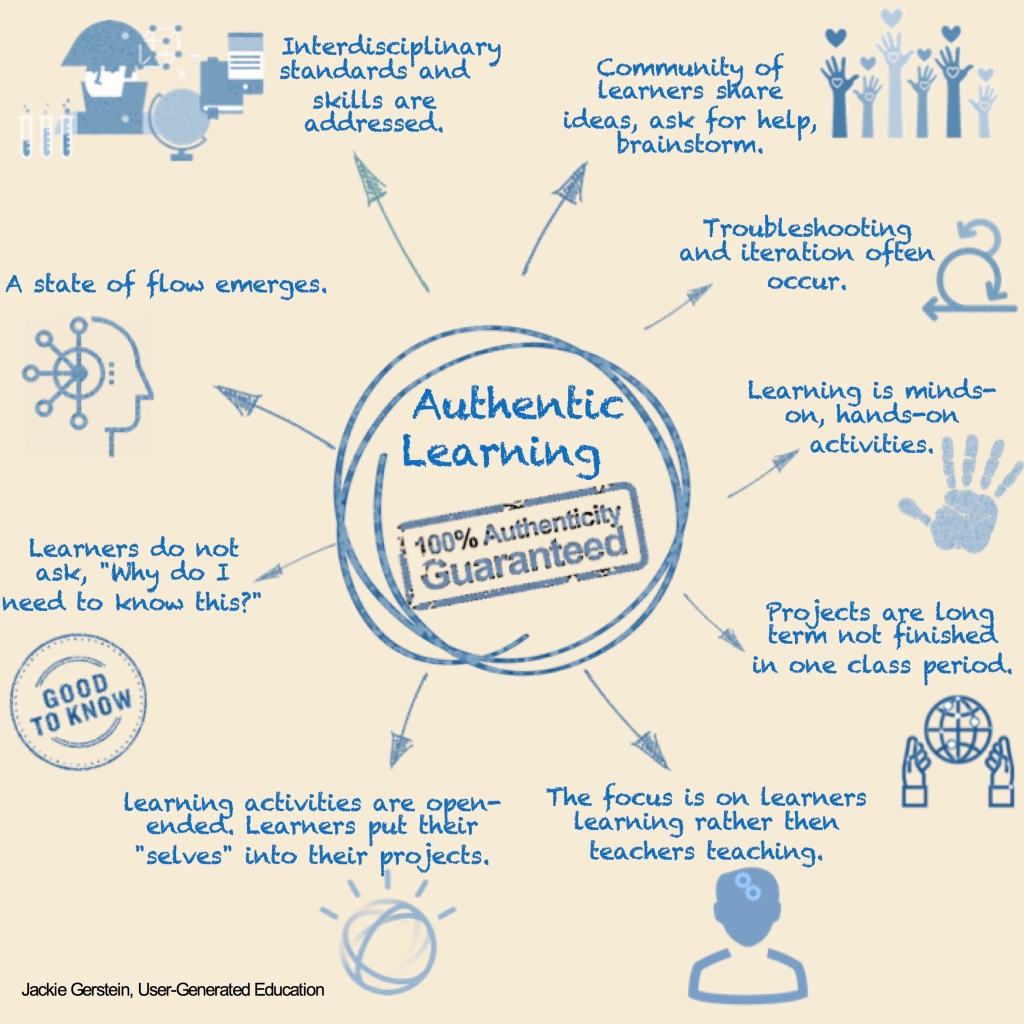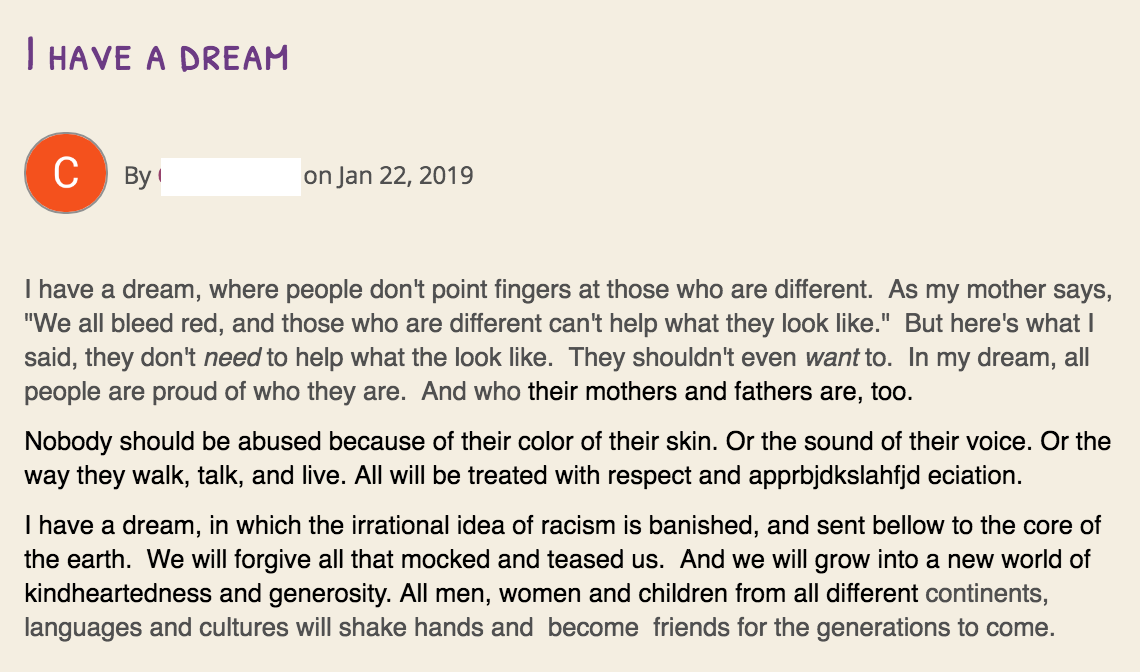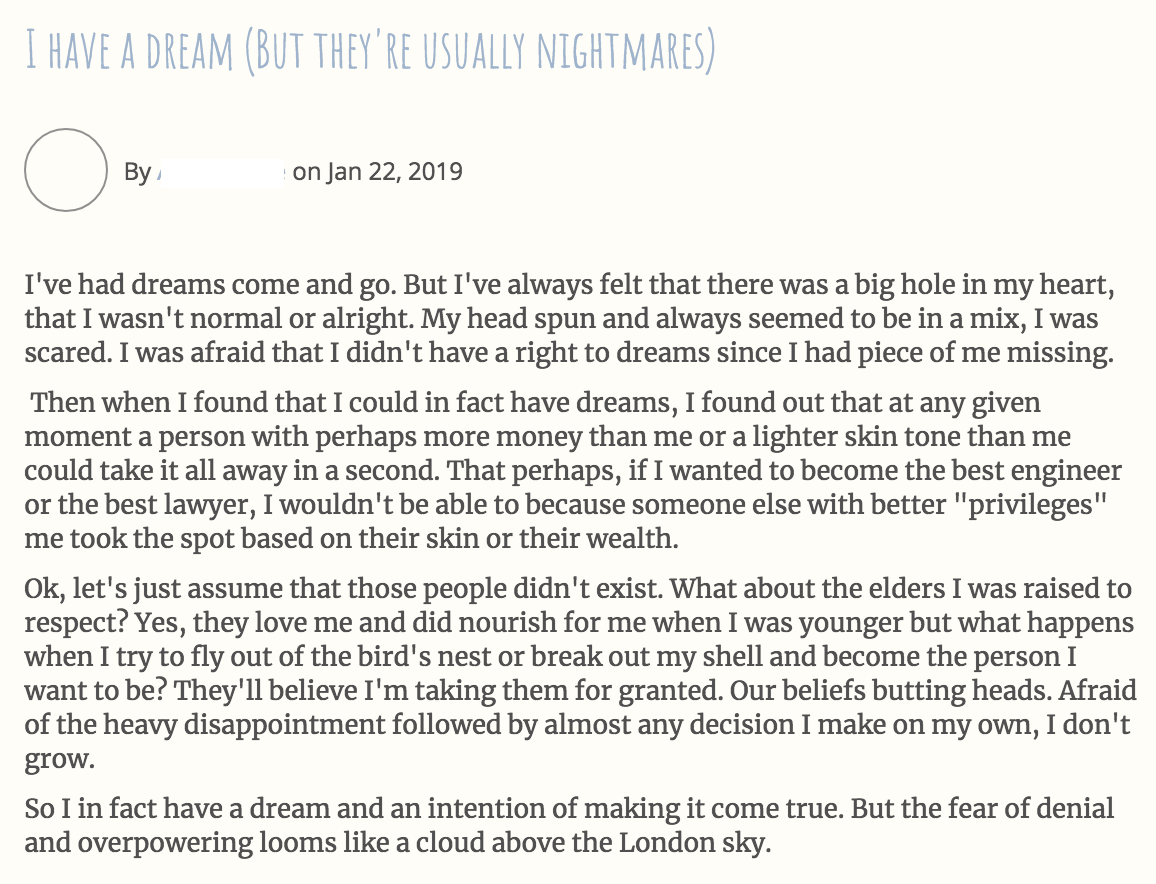Posts Tagged ‘authentic learning’
Principles of Authentic Learning Experiences
Providing authentic learning experiences to all learners should be the highest prior for all administrators, curriculum developers, and teachers.
Authentic learning is learning designed to connect what students are taught in school to real-world issues, problems, and applications; learning experiences should mirror the complexities and ambiguities of real life. Students work towards production of discourse, products, and performances that have value or meaning beyond success in school; this is learning by doing approach (Authentic learning: what, why and how?).
In education, the term authentic learning refers to a wide variety of educational and instructional techniques focused on connecting what students are taught in school to real-world issues, problems, and applications. The basic idea is that students are more likely to be interested in what they are learning, more motivated to learn new concepts and skills, and better prepared to succeed in college, careers, and adulthood if what they are learning mirrors real-life contexts, equips them with practical and useful skills, and addresses topics that are relevant and applicable to their lives outside of school. For related discussions, see 21st century skills, relevance, and rigor (Authentic Learning).
The bottom line, in my perspective, is that learners view their experiences as having relevancy to their own lives, that they address their interests and needs.
Qualities of Authentic Learning
I believe authentic learning experiences have the following qualities (which, by the way, are way too, often are not the qualities of many classroom activities):
- A state of flow – learners often say, “Is it time to go already?” For more about this, see Flow – A Measure of Student Engagement https://usergeneratededucation.wordpress.com/2011/01/12/flow-a-measure-of-student-engagement/.
- Interdisciplinary standards and skills are addressed. For more about this, see All Lessons Should Be Interdisciplinary https://usergeneratededucation.wordpress.com/2019/01/13/all-lessons-should-be-interdisciplinary/
- The focus is on learners learning rather than teachers teaching. For more about this, see ‘The Objective of Education Is Learning, Not Teaching’ http://knowledge.wharton.upenn.edu/article/the-objective-of-education-is-learning-not-teaching/.
- Often are minds-on, hands-on activities. For more about this, see The Imperative of Experiential and Hands-On Learning https://usergeneratededucation.wordpress.com/2016/12/23/the-imperative-of-experiential-and-hands-on-learning/.
- Learners do not ask, “Why do I need to know this?” Because authentic learning involves student voice and choice. they develop their own constructivist reasons for their need to know. For more about this, see Why Do I Need to Know This? https://usergeneratededucation.wordpress.com/2014/03/16/why-do-i-need-to-know-this/ .
- The learning activities are open-ended so learners put their “selves” into their projects. For more about this, see Open Ended Learning: What, Why, and How https://thehomeschoolscientist.com/open-ended-learning-resource/.
- Projects are long term not finished in one class period. They take many hours, many class periods.
- Troubleshooting and iteration often occur. Learning as an iterative process is discussed in Educators as Lead Learners https://usergeneratededucation.wordpress.com/2015/02/15/educators-as-lead-learners/.
- The learners become a community of learners sharing ideas, asking for help, brainstorming. For more about this, see The Importance of Building Community in the Classroom https://www.teachervision.com/blog/morning-announcements/importance-building-community-classroom

Some Recent Examples of Authentic Learning
Here are some recent examples I have done with my learners – one class did a social entrepreneurship unit while another class made Makey Makey Marble Mazes. I posted videos so their engagement can be seen.
Social Entrepreneurship
My students are finishing a unit on social entrepreneurship where they started a business to raise monies for a local nonprofit. They created a market survey using a Google Form, which asked about products, price points, potential nonprofit organization recipients of the profits; analyzed survey results, decided on and tested products; developed an expense sheet, using Google Sheets, for expenses and income; created a business plan that included the name of company, cost analysis, promotional plan; made a promotional flyer; created a sales and record sheet; delivered products; and managed monies.
For more information about this unit, see Elementary Social Entrepreneurship: A Perfect STEAM Lesson https://usergeneratededucation.wordpress.com/2018/05/13/elementary-social-entrepreneurship-a-perfect-steam-lesson/.
Makey-Makey Marble Mazes
Another group of earners made a Makey-Makey Marble Mazes as described by @Colleen Graves, see https://colleengraves.org/2018/05/04/makey-makey-marble-maze-and-5th-grade/
Reflection
I absolutely love planning authentic learning experiences. I get to use my creativity to plan and implement them. It does take lots of pre-planning – finding resources, usually videos, and purchasing, gathering, and organizing the resources used.
I also love watching how excited learners get doing them. There is 100% engagement. I’ve said before that being an experiential educator, there is lots of pre-planning but the learners work harder than me during class time – as it should be.
The Over Promotion of Failure

Almost daily I see posts on social media by educators promoting the benefits of failure. It often seems that there is a push to intentional embed failure into instructional activities. This always rubs me the wrong way. Failure has almost universal negative connotations. It doesn’t feel good and sometimes it is extremely difficult, if impossible, to recover from big failures.
For the past several years we’ve been bombarded with advice about the “wisdom of failure.” Books by business giants and self-help gurus tout the importance of learning from mistakes. The problem with the focus on failure is that failure is a weak process when put up directly against its counterpart: success.
I want to be clear that I’m not against learning from failure. It’s certainly useful that humans have the rare biological luxury of being able to learn, non-lethally, from our failures — we can remember them, share stories about them, even laugh about them. And all the stories and lessons about what you can learn from failure represent real opportunities to do better. The problem is that none of the advice and literature on failure fairly compares learning from failure to learning from success.
We have to ask how abundant or common are useful failures compared to useful successes? If opportunities for learning are rare, it’s hard to make a practice out of them. Unfortunately, truly useful failures that change our thinking (as opposed to merely stupid failures that just confirm what we already should have known) are relatively rare. (http://www.businessinsider.com/we-learn-more-from-success-than-failure-2014-6)
Focusing on success in practice does not translate in attempting to craft learning experiences into ones whereby learners have no struggles; achieve success or desired results on first attempts and iterations. In fact, I believe that authentic learning experiences should require multiple iterations prior to their successfully completion. This mimics real life learning.
The expectation then becomes that learners will struggle with their tasks, that they will focus from what went right and build upon these elements to have increasingly successful iterations within their process of learning the given task. I reframe the idea of failure, that oftentimes occur within open-ended, ill-defined projects, as things didn’t go as originally planned. It is just a part of the learning process. I explain to my learners that they will experience setbacks, mistakes, struggles. It is just a natural part of real world learning. Struggles, setbacks, and mistakes are not discussed as failure but as parts of a process that need improving. The focus becomes on what went right and on how learners can increase those aspects that were successful. The underlying learning principle becomes success breeds more success.
Learning from success is an active process that needs to become part of an organization’s culture. You just need to ensure that at least some of your “after action” reporting is dedicated to what went right. Even an event that was largely a failure probably has some small successes that need to be shared. (http://www.businessinsider.com/we-learn-more-from-success-than-failure-2014-6)
Within this framework, learners then reflect on their learning experiences coming from a place of success with questions such as:
- What specific actions did you take that were successful within your learning task?
- What did you do to decrease your liabilities during your learning task?
- What personal and social resources did you draw upon if and when you reached an impasse with your learning task?
- What strategies did you use to self-regulate your setbacks and frustrations if and when they occurred during your learning task?
- What did you see as your major strengths during the learning task?
- What aspects of your learning will you take into future learning experiences in order to increase your chances of being successful with similar tasks?




